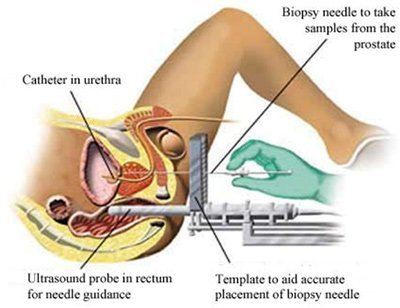Transperineal Prostate Biopsy
What is transperineal prostate biopsy?
A prostate biopsy is a procedure to obtain samples of tissue from the prostate gland. This can be performed through the rectum (transrectal) or through the skin between the scrotum and anus (transperineal). Transperineal biopsies are cleaner and have a much reduced risk of serious infections compared to transrectal biopsies.

How is transperineal prostate biopsy performed?
A general anaesthetics is administered for this procedure. A fine needle is used to collect a number of tissue samples from the prostate gland under guidance of a small ultrasound probe placed into the rectum which provides live picture of the prostate gland.
Generally about twenty biopsies are taken randomly from representative regions of the prostate gland. More or less biopsies may be taken depending on the size of the prostate gland. If abnormalities of the prostate gland areseen on ultrasound, then these will also be biopsied.
MRI detected lesions can be superimposed on to the live ultrasound picture using MRI/US fusion technology to allow a targeted biopsies of the MRI abnormality.
Why are prostate biopsies done?
A prostate biopsy is used to detect prostate cancer. Indications include:
- Elevated PSA
- Prostate abnormalities on digital rectal examination
- MRI detected prostate abnormalities
- Regular biopsies as part of an active surveillance protocol to monitor low risk prostate cancers
What are the risks of transperineal biopsies?
Common risks associated with transperineal prostate biopsies include:
- Bruising around the skin – this is usually minor and will disappear after 1-2 weeks
- Blood in the urine – it is normal to have a small amount of blood in the urine for up to one week
- Blood in the semen – because semen is produced by the prostate, it is common to notice red or rust colouring to the semen after a prostate biopsy. This is not a cause for concern, this will likely persist for several weeks after the biopsy.
- Difficulties urinating – in some men with pre-existing enlarged prostates, prostate biopsy can cause difficulties passing urine due to prostatic swelling. This may last for about one week. Medications can be given to help urination, rarely a temporary urinary catheter must be inserted if urination is not possible.
